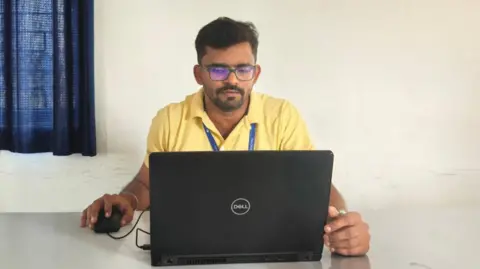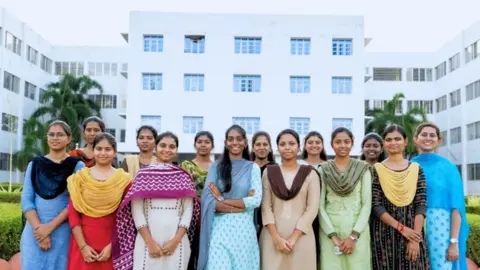To get an ideaTechnology Reporter, Mumbai
 NextWealth
NextWealthVirudhunagar, a city in southeast India, boasts temples dating back thousands of years.
But not far from these ancient places, people are working on the latest technology: artificial intelligence.
One of them is Mohan Kumar.
“My role is to annotate the AI. I collect data from various sources, label it, and train AI models so they can recognize and predict objects. Over time, the models become semi-controlled and can make decisions on their own,” he says.
India has long been a hub for IT support outsourcing, with cities like Bangalore and Chennai being traditional hubs for such work.
But in recent years, firms have been moving their operations to much more remote areas, where staffing and facilities costs are lower.
This trend is known as cloud farming and artificial intelligence has given it another boost as many cities like Virudhunagar are home to firms working on artificial intelligence.
So does Mr. Kumar think he's missing out on a lot by not being in a big city?
“From a professional point of view, there is not much difference. Be it in small towns or metro cities, we work with the same clients across the globe from the US and Europe, and the training and skills required are the same,” says Mr. Kumar.
 Mohan Kumar
Mohan KumarMr. Kumar works at Desicrew. Founded in 2005, the company has become a pioneer in the field of cloud farming.
“We realized that instead of forcing people to migrate to cities in search of jobs, we could create jobs where people already live,” says Mannivannan JK, chief executive of Desicrew.
“For too long, opportunity has been concentrated in cities, leaving rural youth behind. Our mission has always been to create world-class careers closer to home, while proving that quality work can be done anywhere.”
Desicrew handles all types of outsourced work, including software testing for start-ups, creating AI training datasets, and content moderation.
At the moment, 30 to 40% of its work is related to artificial intelligence, “but very soon this will grow to 75 to 100%,” says Mr. J.K.
Much of this work is transcription – converting sound into text.
“Machines understand text much better,” he explains.
“For AI to work naturally, machines must be trained to understand differences in the way people speak. This is why transcription is such an important step: it forms the basis for machines to understand and respond across different languages, dialects and contexts.”
According to Mr. JK, there is no disadvantage to doing such work in a small town.
“People often believe that rural areas are underdeveloped, but our centers replicate urban IT centers in every way – secure data access, reliable connectivity and uninterrupted power supply. The only difference is the geographical location.”
About 70% of its employees are women: “For many, this is their first paid job and the impact on their families is transformative, from financial security to education for their children,” says Mr JK.
 NextWealth
NextWealthFounded in 2008, NextWealth has also been a pioneer in cloud farming.
The company is headquartered in Bangalore and has a workforce of 5,000 people across 11 offices in smaller cities across India.
“Sixty percent of Indian graduates come from small cities, but most IT companies hire only from metros. This leaves behind a huge untapped pool of smart first-generation graduates,” says Mythili Ramesh, co-founder and managing director of NextWealth.
“Many of these students are first-generation graduates. Their parents are farmers, weavers, tailors, policemen – families who take out loans to finance their education,” she says.
NextWealth started out outsourcing work in the back offices of large companies, but five years ago switched to artificial intelligence.
“The world's most advanced algorithms are trained and tested in small towns in India,” says Ms. Ramesh.
About 70% of its work comes from the United States.
“Every AI model, from a system like ChatGPT to a facial recognition system, needs huge amounts of human-labeled data. This is the basis of cloud farming.”
She believes there is still a lot of work ahead.
“In the next 3-5 years, AI and GenAI will create approximately 100 million jobs in training, verification and real-time processing. India’s small towns can become the backbone of this workforce.”
She hopes that India can remain a hub for such work.
“Countries like the Philippines may catch up, but India's scale and early start of AI supply gives us a five to seven year lead. We must take advantage of this before the gap closes,” she says.
K.S. Viswanathan is a technology consultant. He previously worked for the National Association of Software and Services Companies of India, a trade association for outsourcing firms.
“Silicon Valley may be building artificial intelligence engines, but the day-to-day work that makes those engines reliable is increasingly being done by India's cloud farming industry,” he says.
“We are truly at a turning point. If cloud farming continues to scale, small-town India could very well become the world's largest AI operations hub, just as it became an IT services hub two decades ago.”
But success is not guaranteed.
While Next Wealth and Desicrew claim to have access to a reliable and secure internet connection, Mr Viswanathan says this is not always the case in smaller towns in India.
“Reliable high-speed Internet and secure data centers do not always match those in metropolitan areas, making data security an ongoing challenge.”
Even with good connections, work needs to be done to reassure clients.
“The biggest problem is perception, not a technical problem. International clients often believe that small cities cannot meet data security standards, even if the systems are secure. Trust must be earned through implementation.”
Back at NextWealth, Dhanalakshmi Vijay is “tuning” the AI. For example, if she confuses two similar items, such as a blue denim jacket and a dark blue shirt, she will adjust the pattern.
“These corrections are then fed back into the system, adjusting the model so that the next time it encounters a similar case, it performs better. Over time, the AI model accumulates experience, just like updating software with regular patches to make it more accurate and reliable,” says Ms. Vijay.
This kind of work has an impact in the real world.
“My team and I indirectly train artificial intelligence models to make your online shopping experience easy and hassle-free,” she says.









